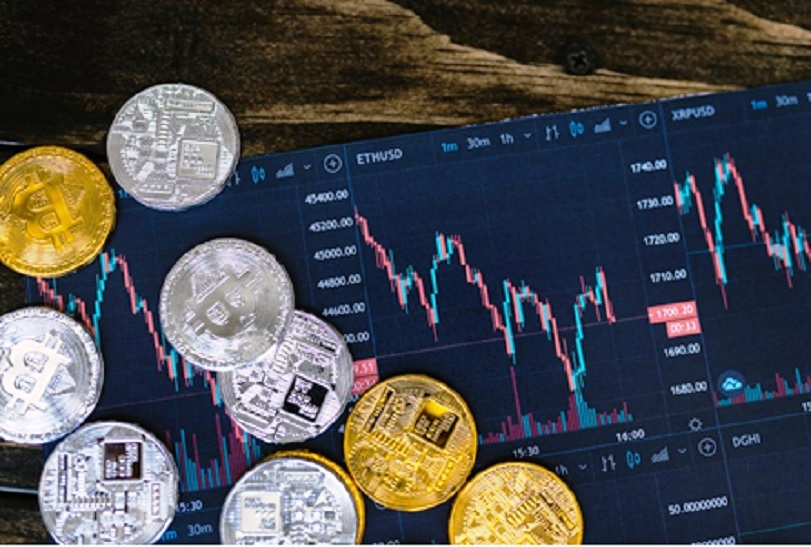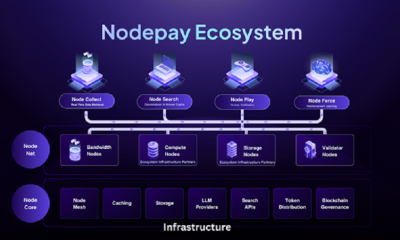Economy
CBN Moves to Formally Legalise Crypto Currency in Nigeria

By Modupe Gbadeyanka
Deputy Director/Head, Payments System Policy and Oversight at the Central Bank of Nigeria (CBN), Mr Musa Jimoh, has disclosed that the apex bank has commenced arrangement to introduce a digital currency in the country a move to key into the global adoption of Crypto currency initiative.
According to Guardian, the apex bank executive made this disclosure at the Crypto currency conference held recently in Lagos.
Mr Jimoh was quoted to have said at the event that, CBN cannot stop the tide of waves generated by the blockchain technology and its derivatives.
“Currently, we have taken measures to create four departments in the institution that are looking forward to harmonise the white paper on Crypto currency.”
Crypto currency is a digital currency in which encryption techniques are used to regulate the generation of units of currency, and verify the transfer of funds, operating independently of a central bank.
Before now, the CBN had been wary to adopting digital currency until it had concluded assessment on its transaction methodology, especially as it has been said that “decentralised crypto currencies such as bitcoin now provide an outlet for personal wealth that is beyond restriction and confiscation.”
Speaking on the development, President of Information Security Society of Nigeria (ISSAN), Dr David Isiawe, said: “The reality that is before us today, particularly in Nigeria, is that the Distributed Ledger Technology (DLT), blockchain and Crypto currency are facts that we must face, whether we like it or not. We cannot wish this reality away.
“It is made worse when we realise that we are still grappling with current challenges of e-commerce and other electronic payment systems but technology development and advancements are not waiting.
“The impact of the emergence of blockchain and Crypto currency will be felt in the nation just as in the global community.
“Nigerian must be proactive rather than reactive by considering how these technologies would affect and influence our lifestyles and business operations and channel, and thus fashion our rules of engagement for their adoption.”
Mr Isiawe also admonished prospective investors to be careful investing in Crypto currencies, as every investment has its share of risks.
The conference tagged: “Learning to Glow with the Flow,” also served as the debut of a new coin, Corion.
Highlighting the coin, the President, Corion Platform, Ida Frauda, said: “Crypto currency is a currency that allows parties to exchange value. Unlike gold, paper money and other means of payments, Crypto currency is digital and decentralised granting transactions to be made without intermediaries and giving the transactors control over their money.
“With the Corion, users have daily payments and value storage with a staple price, fair distribution of benefits, keys to the challenges to engage the majority in using Crypto currency on a daily basis, an ecosystem to get the financial benefits from merely being a user. They make transaction in multiple currencies, peer-to-peer exchange in a limitless market in the global market; make money from the daily coin release from the increasing number of users instead of speculation.”
For the conference organiser, Chimezie Chuta, Nigeria should create learning institutions to educate and engage the youths and make them relevant in this space.
He urged the youths to equip themselves with learning blockchain, as it is the technology of the future. “Any sector can be on it like the Internet, which will lead to a skill shortage. People should read online, and research as many firms are going to be requiring blockchain experts in their sphere.
“The blockchain technology can be used across boards like smart contract, e-voting, identity management, healthcare. We should not be sole users rather; we should harness our numerical strength in his space,” said.
The Chief Technical Officer (CTO), Digital Encode, Oluseyi Akindeinde, said crypto currency is the currency of the future. “This currency cannot be monopolized by any government or company. It allows transparency; the velocity of transactions can be monitored with the blockchain, as it cuts across borders of accounts with the use of Applications.”
Highlighting the use of blockchain for transactions, Akindeinde said: “The technology is not only used for Crypto currency, although, the naira can be on the blockchain just like some other countries, so instead of spending bitcoin, everyone can spend the naira and transfer from peer to peer without going to financial institutions. Nonetheless, it can be used for land registration, stock exchange. Everything that has value can be used on the blockchain.”
Speaking on the security of the blockchain, he said: “If the CBN places the naira on it, then they are securing it with the hashing power of the blockchain. Presently based on the design which has been in existence since 2009, the blockchain is hack-proof due to the encryption and cryptography technology.
“The reasons banks are prone to hack is because they are centralised. Blockchain is decentralised. It is located everywhere there is Internet, so except someone hacks the entire Internet, then they can hack the blockchain system.”
Source: Guardian
Economy
NASD Exchange Rises 1.22% on Sustained Bargain-Hunting

By Adedapo Adesanya
Strong appetite for unlisted stocks further raised the NASD Over-the-Counter (OTC) Securities Exchange by 1.22 per cent on Friday, February 27.
Data revealed that the NASD Unlisted Security Index (NSI) was up by 49.41 points to 4,083.87 points from 4,034.46 points, and lifted the market capitalisation by N19.56 billion to N2.433 trillion from N2.413 trillion.
The volume of securities bought and sold by investors increased by 243.0 per cent to 4.5 million units from 1.3 million units, and the number of deals grew by 15.8 per cent to 44 deals from 38 deals, while the value of securities went down by 19.7 per cent to N82.5 million from N102.8 million.
Central Securities Clearing System (CSCS) Plc ended the session as the most active stock by value on a year-to-date basis with 35.0 million units valued at N2.1 billion, followed by Okitipupa Plc with 6.3 million units worth N1.1 billion, and Geo-Fluids Plc with 122.8 million units transacted for N480.4 million.
Resourcery Plc ended the day as the most traded stock by volume on a year-to-date basis with 1.05 billion units sold for N408.7 million, followed by Geo-Fluids Plc with 122.8 million units valued at N480.4 million, and CSCS Plc with 35.0 million units traded for N2.1 billion.
There were six price gainers yesterday led by FrieslandCampina Wamco Nigeria Plc, which added N9.02 to close at N111.46 per unui compared with the previous day’s N102.44 per unit, Nipco Plc appreciated by N6.00 to N284.00 per share from N278.00 per share, CSCS Plc recouped N1.87 to sell at N70.12 per unit versus Thursday’s value of N68.25 per unit, Geo-Fluids Plc improved by 17 Kobo to close at N3.18 per share versus N3.01 per share, Industrial and General Insurance (IGI) Plc advanced by 5 Kobo to sell at N50 Kobo per unit versus the preceding day’s 45 Kobo per unit, and Acorn Petroleum Plc chalked up 2 Kobo to settle at N1.34 per share, in contrast to the previous day’s N1.32 per share.
Economy
FX Liquidity Crunch Sinks Naira to N1,363/$1 at NAFEX, N1,370/$1 at Black Market

By Adedapo Adesanya
The Naira performed poorly against the United States Dollar in the different segments of the foreign exchange (FX) market on February 27, closing the week without a gain.
In the black market, the domestic currency weakened against the Dollar yesterday by N5 to close at N1,370/$1 compared with Thursday’s closing price of N1,365/$1, and at the GT Bank forex desk, it lost N2 to sell N1,369/$1 versus the N1,367/$1 it was sold a day earlier.
Yesterday, the Nigerian Naira lost N3.75 or 0.26 per cent against the greenback at the Nigerian Autonomous Foreign Exchange Market (NAFEX) to trade at N1,363.39/$1 compared with the previous day’s N1,359.82/$1.
Also, the Naira depreciated against the Euro at the official market during the session by N2.33 to quote at N1,609.22/€1 versus N1,606.89/€1, and appreciated against the Pound Sterling by N6.74 to settle at N1,836.49/£1 compared with the preceding session’s N1,843.23/£1.
The Naira’s latest depreciation occurred as FX demand continued to outpace available supply, intensifying pressure in the market.
In response to the negative momentum, the Central Bank of Nigeria (CBN) intervened by selling Dollars to banks and other authorised dealers in an effort to stabilise the local currency. The move came barely a week after the apex bank had purchased about $190 million from the foreign exchange market to temper the Naira’s rally.
Specifically, the CBN injected $200 million into the official market between Tuesday and Wednesday through an intervention call. However, the liquidity support proved insufficient to reverse the currency’s downward trend.
Meanwhile, the cryptocurrency market declined on Friday, with Solana (SOL) down by 10.4 per cent to $78.60, as Dogecoin (DOGE) decreased by 9.5 per cent to $0.0982.
Further, Cardano (ADA) slumped 8.9 per cent to $0.2647, Ethereum (ETH) slipped by 8.6 per cent to $1,859.10, Ripple (XRP) shrank by 8.2 per cent to $1.30, Litecoin (LTC) lost 1.4 per cent to close at $52.39, Bitcoin (BTC) slid 5.9 per cent to $63,686.39, and Binance Coin (BNB) went down by 4.9 per cent to $596.64, while the US Dollar Tether (USDT) and the US Dollar Coin (USDC) traded flat at $1.00 apiece.
Economy
Oil Prices Climb on Geopolitical Anxiety

By Adedapo Adesanya
Oil prices rose about 2 per cent on Friday, with traders bracing for supply disruptions as nuclear talks between the United States and Iran were without an agreement.
Brent crude futures settled at $72.48 a barrel after chalking up $1.73 or 2.45 per cent, while US West Texas Intermediate crude futures finished at $67.02 a barrel, up $1.81 or 2.78 per cent.
The two sides agreed to extend indirect negotiations into next week, but traders grew sceptical that an agreement between US President Donald Trump’s administration and Iran was possible.
The US and Iran held indirect talks in Geneva on Thursday after Mr Trump ordered a military buildup in the region.
Oil prices gained during the talks, on media reports indicating that discussions had stalled over U.S. insistence on zero enrichment of uranium by Iran. However, prices eased after the mediator from Oman said the two sides had made progress.
They plan to resume negotiations with technical-level discussions scheduled next week in Vienna, Omani Foreign Minister Sayyid Badr Albusaidi said on X.
Market analysts noted that geopolitical risk premiums of $8 to $10 a barrel have been built into oil prices on fears that a conflict will disrupt Middle East supply through the Strait of Hormuz, where about 20 per cent of global oil supply passes.
To cushion the impact from a possible strike, one of the world’s largest oil producers, the United Arab Emirates (UAE), is set to export more of its flagship Murban crude in April, while Saudi Arabia said it would also increase oil production.
Additionally, Saudi Arabia may raise its April crude price to Asia for the first time in five months due to higher demand from India to replace Russian supplies, potentially raising it by about $1 a barrel.
Meanwhile, the Organisation of the Petroleum Exporting Countries and its allies (OPEC+) is likely to consider raising oil output by 137,000 barrels per day for April at its March 1 meeting, after suspending production increases in the first quarter.
The resumption of output increases after a three-month pause would allow Saudi Arabia and the UAE to regain market share at a time when other OPEC+ members, such as Russia and Iran, contend with Western sanctions while Kazakhstan recovers from a series of oil production setbacks.
Eight OPEC+ producers – Saudi Arabia, Russia, the United Arab Emirates, Kazakhstan, Kuwait, Iraq, Algeria and Oman will meet at the meeting on Sunday.
-

 Feature/OPED6 years ago
Feature/OPED6 years agoDavos was Different this year
-
Travel/Tourism10 years ago
Lagos Seals Western Lodge Hotel In Ikorodu
-

 Showbiz3 years ago
Showbiz3 years agoEstranged Lover Releases Videos of Empress Njamah Bathing
-

 Banking8 years ago
Banking8 years agoSort Codes of GTBank Branches in Nigeria
-

 Economy3 years ago
Economy3 years agoSubsidy Removal: CNG at N130 Per Litre Cheaper Than Petrol—IPMAN
-

 Banking3 years ago
Banking3 years agoSort Codes of UBA Branches in Nigeria
-

 Banking3 years ago
Banking3 years agoFirst Bank Announces Planned Downtime
-

 Sports3 years ago
Sports3 years agoHighest Paid Nigerian Footballer – How Much Do Nigerian Footballers Earn






















11 Comments